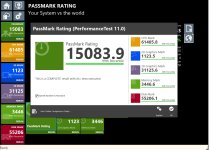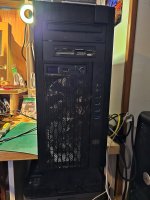EverStaR
Experienced Member
- Joined
- Jan 17, 2024
- Messages
- 195
Last edited:
As a writer I will say having 6 monitors helps me write better. And as a writer with poor eyesight having a gigantic monitor with high resolution and excellent scaling helps me see what I'm writing better.Yeah, even the most modern multi core multi GB RAM multi terabyte monster GPU system won't let a great writer write any faster or any better; Isaac Azimov used a TRS-80 Model II and it was enough machine for the job.
CAD and 3D are also helped along by modern equipment being able to drive larger high-resolution displays. Video production also benefits from higher clock speeds and GPU rendering. I can encode an hour long TV show at 1080p in about 5 minutes. Back in the day it would take me all night to do an hour's worth of video at CRT Television resolutions. So it definitely has gotten faster.The only true performance gains are in eye candy items and games. I can see some gains in the CAD and 3D modeling worlds, but for most things the vast power of modern PCs is wasted.
I wish the entire internet looked that way...Then again, my idea of perfect website design is CNN low bandwidth and my idea of the perfect forum software is a good Usenet reader with a solid and trimmed Usenet feed.
I want it. I want it to have my children.Aren't we forgetting 4+ CPU systems? https://www.ebay.com/itm/200736309992
One aspect of all this too is how Microsoft and software developers kept eating up our new powerful CPUs thus negating quite of the gains we experienced.
Yeah, even the most modern multi core multi GB RAM multi terabyte monster GPU system won't let a great writer write any faster or any better; Isaac Azimov used a TRS-80 Model II and it was enough machine for the job.
The only true performance gains are in eye candy items and games. I can see some gains in the CAD and 3D modeling worlds, but for most things the vast power of modern PCs is wasted.
Then again, my idea of perfect website design is CNN low bandwidth and my idea of the perfect forum software is a good Usenet reader with a solid and trimmed Usenet feed.
The fact that modern software has bloated up so much that it can make even these much improved multi-core CPUs feel slow isn't the hardware's fault; it is objectively better than the old stuff in nearly every possible way. All the nostalgia in the world isn't going to negate that fact. Alas.
LGA2011 i7 right? Depending on model it might actually be better than the available xeons.I'm not sure what software you use, I don't plan on moving from my 2015 i7 platform, maybe I get a Xeon for it just because why not, but it's closing in on 10 years and I have no plans because the computer runs great, snappy, on whatever I do.
I mentioned how I was a relatively early adopter of "consumer-level SMP" back in 1999 when put together that dual Celeron system. Had the 400mhz-rated CPUs overclocked to 552mhz, and that thing truly felt like God's Computer compared to the 233mhz K6 that was my previous system. There's a ton of nostalgia there, and I would go so far as to argue that at least on some subliminal level there were at least *some cases* where that machine subjectively "felt smoother" compared to a single CPU machine of roughly similar aggregate horsepower. (IE, park it next to a faster Pentium III and fire off a multi-threaded Linux kernel build and it may well end up finishing significantly faster, And if you did that in the background you might notice just a little less jerkiness on whatever foreground task you were up to.)
But as delicious at that nostalgia might be, well, it's just that. All rose colored glasses. The flip side of it is for quite a few things, especially games under Windows 2000, that machine would get utterly creamed. For a period around the turn of 2001 I was in the throes of a serious Half-Life (and spinoffs) addiction, along with lovin' me some emulators, so when Fry's had as one of their weekly specials an 800mhz Duron and motherboard for basically zero money I bought it to build into a computer to hook to the TV, and, well, I can't sugar coat it, that thing completely blew the dually away as a gaming machine. Boot the dually into Linux and it might still win the kernel compile cookoff, but the blunt truth is that for a lot of tasks even today it's single-thread performance that's going to matter the most for interactive applications.
The beauty of newer multi-core CPUs compared to the old dual-socket systems is they're better at both; not only are the individual cores faster, their shared caches and faster on-die interconnects cut down on the overhead and therefore experience less degredation in single-thread performance while still enabling hardware multiprocessing. The fact that modern software has bloated up so much that it can make even these much improved multi-core CPUs feel slow isn't the hardware's fault; it is objectively better than the old stuff in nearly every possible way. All the nostalgia in the world isn't going to negate that fact. Alas.


It is always funny how many discussions on this forum devolve into "Ok, but it won't perform as well as a modern PC". Like duh, you think all the TRS-80 users are using them because they out-bench a threadripper?Seriously I don't believe I care how well it is going to actually perform do you?
I always wanted a 6-way Pentium Pro but you need the complete setup and some kind of use for it. Dual PPro was good enough same with dual P3 and P2 slot 1 systems.
LGA2011 i7 right? Depending on model it might actually be better than the available xeons.
I built my dual xeon in 2018 with parts mostly from 2015(the motherboard was new but I suspect it had been in production for a little bit) with plans to make it last until 2028. So far, so good.
.... Consider a guitar player instead.
...
Audio recording and multitrack composition is ideal for parallelization. You can increase sample rates to infinity. Instant benefit from extra core and RAM.
It's a glorified typewriter, and forces more focus, IMO.Writing is about the worse example to use - it's known that famous writers prefer 80s tools and that basic text editing peaked in early 90s or so, considering the balance between features and distractions.
Old computer that just does what it does, in that case a very bland text editor, is a perfect tool for getting in the zone.
I happen to be a bass player myself...
If it were that simple. Latency is a primary concern in multi track production. Multitrack audio production is something that I do professionally using the excellent Harrison Mixbus and Mixbus 32C DAWs. I upgraded from a Core i7-3740 to a Core i7-9750 and get worse latency. IRQ architecture and RT kernel friendliness with your specific hardware is way more important than speed and RAM size.
MIDI composition can be done on much less powered machines.
It's a glorified typewriter, and forces more focus, IMO.
I'm not sure what software you use, I don't plan on moving from my 2015 i7 platform, maybe I get a Xeon for it just because why not, but it's closing in on 10 years and I have no plans because the computer runs great, snappy, on whatever I do.
It is always funny how many discussions on this forum devolve into "Ok, but it won't perform as well as a modern PC". Like duh, you think all the TRS-80 users are using them because they out-bench a threadripper?
Always amusing.
We need a vocalist and a drummer then
Drifting a bit off topic, but I'm running Debian Linux. On an older generation system with CentOS and an earlier version of Mixbus using JACK I was under 20ms but that was using an Maudio Delta 1010LT. The newer machine, even with it being close to ten times faster than the old Precision M4300, isn't low enough latency for good overdubbing, so I pull out the M4300 (full PCI slot in the dock) with the 1010LT when doing punch in/out. Using a Focusrite Scarlett 2+2 on the other one. I have several plugins, including an excellent Fairchild 670 emulation.....
Also pretty curious about your case, what kind of latency do you get? What type of system/drivers, ASIO on Windows?
